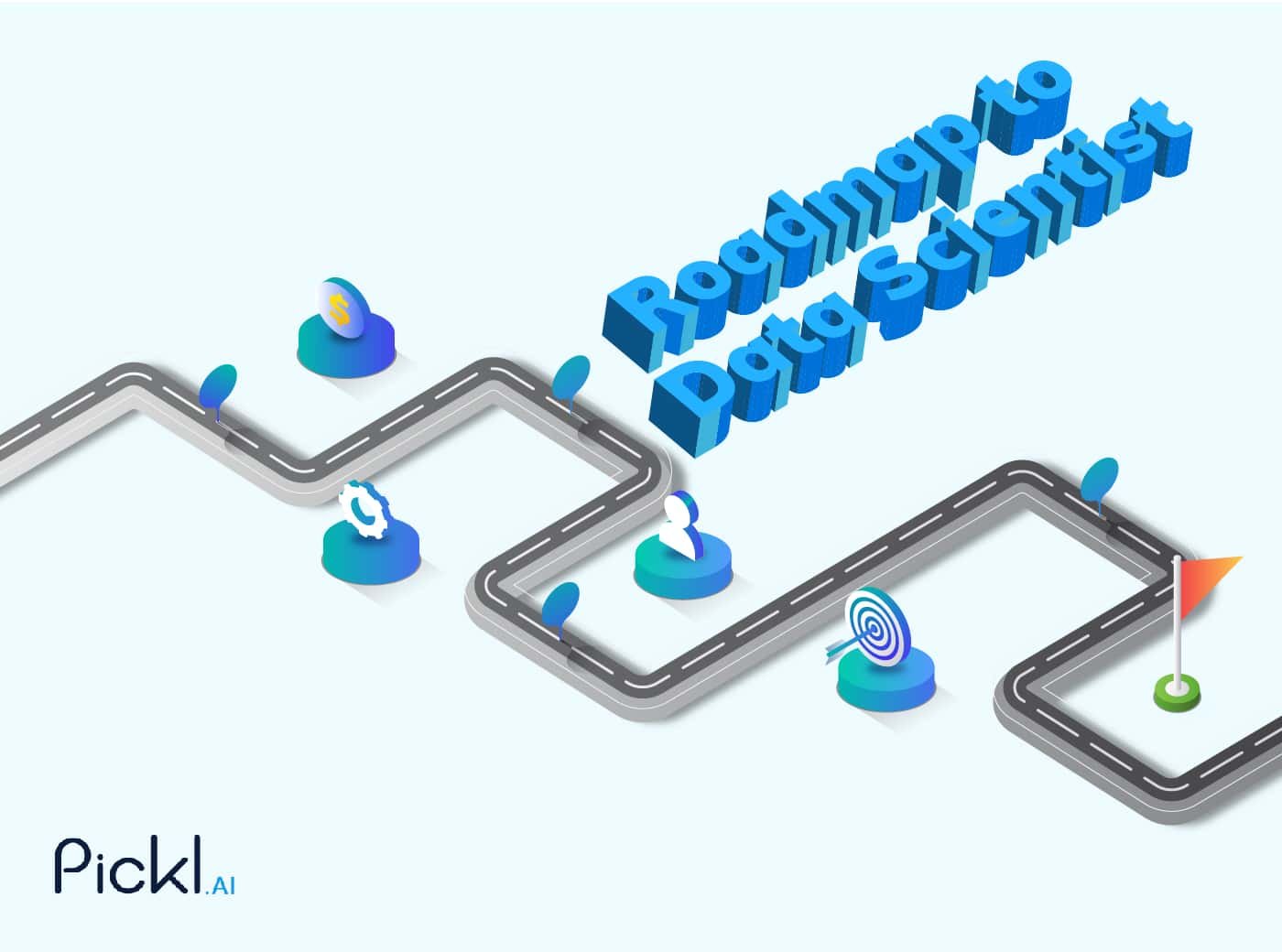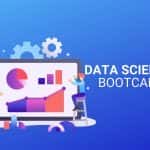In a digital era fueled by data-driven decision-making, the role of a Data Scientist has become pivotal. With the 650% jump in the implementation of analytics, the role of Data Scientists is becoming profound.
Companies are looking forward to hiring crème de la crème Data Scientists. So, how do you establish yourself in this league? This guide throws light on the roadmap to becoming a Data Scientist.
Key Takeaways:
-
Data Science is a multidisciplinary field bridging statistics, mathematics, and computer science to extract insights from data.
-
The roadmap to becoming a Data Scientist involves mastering programming, statistics, machine learning, data visualization, and domain knowledge.
-
The Data Scientist job market is robust, with attractive salaries and opportunities in India and the United States.
-
Pickl.AI’s Data Science program offers a transformative learning experience, equipping students with practical skills and expertise to thrive in the data-driven world.
Data Scientist Market Trends: Riding the Wave of Data Evolution
The Data Science landscape is evolving at an unprecedented pace. From finance to healthcare, e-commerce to entertainment, industries leverage data to optimize processes, enhance customer experiences, and fuel growth. According to recent market trends, the global Data Science market is projected to grow exponentially, driven by the increasing importance of data-driven decision-making.
Understanding Data Science: Bridging the Gap Between Data and Insight
It is the art of extracting meaningful insights from complex data sets. It amalgamates various disciplines such as statistics, mathematics, computer science, and domain expertise to unravel patterns, trends, and correlations. Data Scientists play a crucial role in collecting, cleaning, and analyzing data, ultimately guiding organizations to make informed decisions.
The Data Science Roadmap: Navigating Your Path to Success
Step 1: Learning About Programming or Software Engineering
A strong foundation in programming languages like Python, R, or Java is essential. Software engineering concepts facilitate efficient data manipulation, enabling you to design algorithms, create visualizations, and build machine learning models.
Step 2: Acquiring Statistical Proficiency
A Data Scientist’s toolkit is incomplete without a solid understanding of statistics. Concepts like probability, hypothesis testing, and regression analysis empower you to extract meaningful insights and draw accurate conclusions from data.
Step 3: Dive into Machine Learning and Deep Learning
Master the realm of machine learning algorithms, from linear regression to neural networks. Understanding supervised and unsupervised learning techniques equip you to develop predictive models and uncover hidden patterns.
Step 4: Data Wrangling and Visualization
Data isn’t always in pristine formats. Learning techniques to clean, preprocess, and visualize data allows you to transform raw information into actionable insights.
Step 5: Domain Knowledge Integration
You should get well-versed in Data Science skills with domain expertise. Whether it’s healthcare, finance, or marketing, understanding industry-specific nuances enhances your ability to generate impactful insights.
Data Scientist Jobs & Salary Scope in India & United States: Bridging Continents
India and the United States stand at the forefront of the Data Science revolution. In India, Data Scientist jobs are experiencing a meteoric rise, with diverse industries seeking data-driven insights. The United States, on the other hand, offers lucrative opportunities with its tech giants, startups, and research institutions. As to recent statistics, the average Data Scientist salary in India ranges from INR 6 to 15 lakhs per annum, while in the United States, the average salary of a Data Scientist is $124,377 per annum.
Do’s: Building Your Path to Data Science Success
1. Do Learn the Fundamentals
Master the basics of programming languages like Python and R. These are the building blocks of data manipulation, analysis, and modeling.
Develop a strong foundation in statistics and mathematics. These skills are the bedrock of meaningful data interpretation.
2. Do Gain Practical Experience
Work on real-world projects to apply your skills. Building a portfolio of projects showcases your capabilities to potential employers.
Participate in Data Science competitions like Kaggle. These platforms offer valuable exposure to diverse problem-solving scenarios.
3. Do Specialize and Upskill
Focus on a specific domain or industry. Specialization enhances your expertise and makes you more valuable to potential employers.
Stay updated with the latest advancements in machine learning, deep learning, and Data Science technologies.
4. Do Network and Collaborate
Attend Data Science meetups, conferences, and webinars. Networking exposes you to industry trends and connects you with like-minded professionals.
Collaborate on projects with peers. Teamwork improves your communication and problem-solving skills.
5. Do Embrace Continuous Learning:
Pursue online courses, certifications, and advanced degrees to expand your knowledge and stay competitive.
Read research papers, blogs, and books to keep yourself informed about cutting-edge techniques.
Don’ts: Pitfalls to Avoid on Your Data Science Journey
1. Don’t Neglect the Basics
Skipping over fundamental concepts in pursuit of advanced topics can lead to a weak foundation that can hinder your progress later.
2. Don’t Rely Solely on Theory
Never rely on theoretical knowledge. Practical application is essential to truly understand Data Science concepts.
3. Don’t Ignore Communication Skills
Overlooking the importance of clear communication can impact your professional growth. Data Scientists often need to explain complex findings to non-technical stakeholders.
4. Don’t Get Discouraged
Never give up easily when faced with challenges. The Data Science journey can be challenging, but persistence is key to success.
5. Don’t Stop Learning
And finally, never stop learning. Data Science is rapidly evolving; continuous learning is vital to stay relevant.
Frequently Asked Questions
What educational background is required to become a Data Scientist?
While there is no strict educational path, a strong foundation in mathematics, statistics, and computer science is beneficial. Many Data Scientists have degrees in fields like computer science, mathematics, physics, or engineering.
How do I gain practical experience as a Data Scientist?
Practical experience is crucial. You can work on personal projects, contribute to open-source projects, participate in online competitions (Kaggle), or seek internships in data-related roles to apply your skills in real-world scenarios.
What skills are essential for a Data Scientist?
Data Scientists need proficiency in programming languages like Python or R, machine learning algorithms, statistical analysis, data visualization, and the ability to work with databases. Strong problem-solving and communication skills are also important.
Should I focus on a specific industry or remain versatile?
Both approaches have merits. Focusing on a specific industry (e.g., healthcare, finance) allows you to develop domain expertise. Remaining versatile gives you the flexibility to work across industries and solve diverse data challenges.
How do I transition into a Data Science career from a different field?
Many successful Data Scientists come from diverse backgrounds. Start by building foundational skills, learning relevant tools and techniques, and working on projects demonstrating your Data Science abilities. Networking and pursuing relevant courses can also help in the transition.
Concluding Thoughts
This guide on the roadmap to becoming a Data Scientist illustrates the right way to kickstart your learning journey. Enrolling in the right Data Science program will ensure that you get the right learning platform which can help in catalyzing your professional growth. Data Science is one of the most rewarding career opportunities. As you refine your skills and expertise as a Data Scientist, you position yourself for lucrative employment opportunities that offer competitive remuneration.
Acquire Data Science Skills and Knowledge with Pickl.AI: Your Catalyst for Success
Pickl.AI stands as a beacon of excellence in Data Science education. Our comprehensive Data Science program is meticulously designed to empower aspiring Data Scientists with the tools, knowledge, and hands-on experience needed to excel in the industry.
Ready to embark on your journey to becoming a Data Scientist? Join Pickl.AI’s Data Science program today and unlock a world of possibilities. Shape your future with us!











